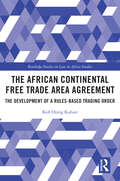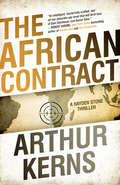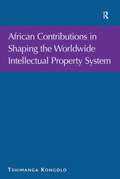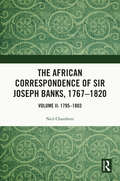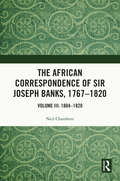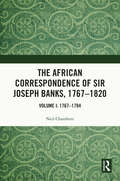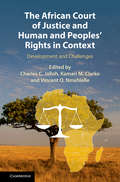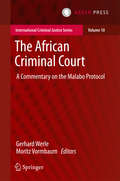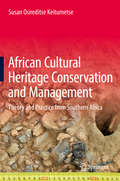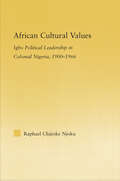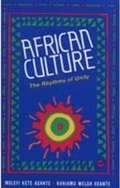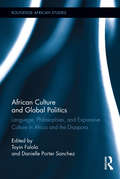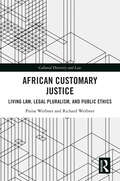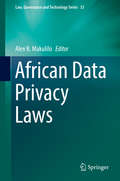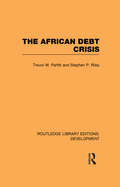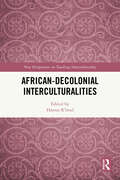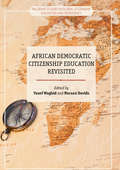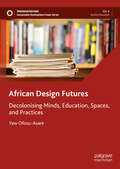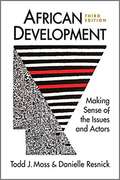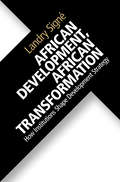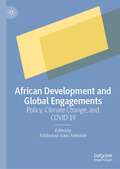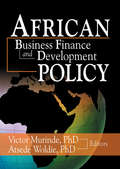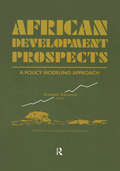- Table View
- List View
The African Continental Free Trade Area Agreement: The Development of a Rules-Based Trading Order (Routledge Studies on Law in Africa)
by Kofi Oteng KufuorIn 2018, the members of the African Union adopted the African Continental Free Trade Area Agreement (AfCFTA). This book examines the AfCFTA, dissecting its key provisions. It stresses the importance of the AfCFTA in the context of increasing episodes of trade protection in Africa, and it theorizes on the role of the treaty organs. The book also examines the importance of citizen participation for the success of the AfCFTA, as well as exploring the role sub-state actors can play. Ultimately, the study adds to the understanding of the array of problems that are associated with regional trade in Africa and the role law plays in resolving these problems. It will be of importance to academics and students of international law, especially those with an interest in African trade law, as well as legal professionals and policymakers.
The African Contract (The Hayden Stone Thrillers #2)
by Arthur Kerns“An intelligent, masterfully crafted, and all-too-plausible spy novel that will thrill fans of Olen Steinhauer and Daniel Silva” (Robert Dugoni, New York Times–bestselling author of Murder One). In the savannahs of Namibia, a boxcar sits, locked and watched. There is no limit to how many people would die from what’s inside. And there is no limit to how many people would kill for it. Hayden Stone is summoned back to the CIA to help navigate the choppy diplomatic waters between the United States, Canada, England, South Africa, and any number of other players in a mission to prevent the worst of weapons from falling into the wrong hands. While representatives from other countries are there to help him, Stone knows the only person he can trust is himself, and that once the weapon is located, all bets are off. His mission will take him into palatial mansions and parched-earth slums, into the shadowy world of black ops and the chaos of an endless war. It will lead him directly into the crosshairs—but whose finger is on the trigger? “Not only is The African Contract a great read, but you know that with Art Kerns’ FBI/CIA background he really knows what he’s writing about.” —M. A. Lawson, author of Rosarito Beach
African Contributions in Shaping the Worldwide Intellectual Property System
by Tshimanga KongoloAfrica is playing an increasingly more significant role in the domain of international intellectual property law, and this book underlines the contributions made by African countries as a group to the development of the current international IP system. It examines in detail their breakthrough proposals and initiatives at the WTO, WIPO and WHO with regard to IP and public health; IP and traditional knowledge, traditional cultural expressions and genetic resources; IP and biodiversity; and exceptions and limitations to copyright. Using Botswana, Burundi, Egypt, Ghana, Kenya, Mauritius, Morocco, South Africa and Tunisia as examples, it examines the systems under which these IP subject matters are protected. From a regional perspective, the book also analyses some initiatives taken by ARIPO, OAPI and the African Union to protect traditional knowledge and traditional cultural expressions, especially in relation to protection of the rights of local farming communities and breeders, regulation of access to biological resources, genetically modified organisms and the proposed establishment of the new Pan-African Intellectual Property Organization (PAIPO). Demonstrating how Africa is now an active player on the international IP scene, this book will be invaluable to those interested in intellectual property law, business and commercial law, and African and international law.
The African Correspondence of Sir Joseph Banks, 1767–1820: Volume II: 1795–1803
by Neil ChambersThis edition brings together in three fully edited volumes the correspondence and associated papers of Sir Joseph Banks regarding European and especially British exploration of Africa from 1767–1820, for the first time publishing this globally scattered material in one place, thereby revolutionizing its availability and understanding of the activities of a key figure who helped organize and publish a series of missions to penetrate the African interior, mainly from West Africa and by crossing the Sahara from Cairo and Tripoli. Banks was a founder in 1788 of the African Association, which mounted many of these missions, including those of Mungo Park to explore the River Niger, and J.L. Burkhardt exploring Syria, Arabia and Egypt. At the time, little was known about the African interior, its peoples, kingdoms and resources, and the aim of the African Association under Banks was to discover what lay there, to make contact with and study its societies, to map them and their lands and help establish trading links. Banks also maintained a lively correspondence with British diplomatic representatives in North Africa, such as James Mario Matra at Tangier and Henry Salt in Cairo, who were a rich source of news. Moreover, as unofficial director of the royal gardens at Kew he sent pioneering plant collectors to gather plants in South Africa, vastly boosting knowledge of this region’s important flora. At home, he corresponded with politicians, government officials, entrepreneurs, navigators, naturalists and campaigners like William Wilberforce about a great range of issues surrounding Africa. This work is multi-disciplinary and will stand alongside existing series of Banks’s correspondence published by Neil Chambers (Scientific Correspondence, 2007; Indian and Pacific Correspondence, 2007–14). It will appeal to scholars of African history in the Early Modern Period, to those studying exploration and collecting as well as those interested in natural history, the history of science, geography, cartography and the Enlightenment. An Introduction, detailed Calendar of Correspondents, Timelines for each volume and a comprehensive Index supplement the footnotes to nearly 800 documents included in this fascinating and comprehensive new series.
The African Correspondence of Sir Joseph Banks, 1767–1820: Volume III 1804–1820
by Neil ChambersThis edition brings together in three fully edited volumes the correspondence and associated papers of Sir Joseph Banks regarding European and especially British exploration of Africa from 1767–1820, for the first time publishing this globally scattered material in one place, thereby revolutionizing its availability and understanding of the activities of a key figure who helped organize and publish a series of missions to penetrate the African interior, mainly from West Africa and by crossing the Sahara from Cairo and Tripoli. Banks was a founder in 1788 of the African Association, which mounted many of these missions, including those of Mungo Park to explore the River Niger, and J.L. Burkhardt exploring Syria, Arabia and Egypt. At the time, little was known about the African interior, its peoples, kingdoms and resources, and the aim of the African Association under Banks was to discover what lay there, to make contact with and study its societies, to map them and their lands and help establish trading links. Banks also maintained a lively correspondence with British diplomatic representatives in North Africa, such as James Mario Matra at Tangier and Henry Salt in Cairo, who were a rich source of news. Moreover, as unofficial director of the royal gardens at Kew he sent pioneering plant collectors to gather plants in South Africa, vastly boosting knowledge of this region’s important flora. At home, he corresponded with politicians, government officials, entrepreneurs, navigators, naturalists and campaigners like William Wilberforce about a great range of issues surrounding Africa. This work is multi-disciplinary and will stand alongside existing series of Banks’s correspondence published by Neil Chambers (Scientific Correspondence, 2007; Indian and Pacific Correspondence, 2007–14). It will appeal to scholars of African history in the Early Modern Period, to those studying exploration and collecting as well as those interested in natural history, the history of science, geography, cartography and the Enlightenment. An Introduction, detailed Calendar of Correspondents, Timelines for each volume and a comprehensive Index supplement the footnotes to nearly 800 documents included in this fascinating and comprehensive new series.
The African Correspondence of Sir Joseph Banks, 1767–1820: Volume I: 1767–1794
by Neil ChambersThis edition brings together in three fully edited volumes the correspondence and associated papers of Sir Joseph Banks regarding European and especially British exploration of Africa from 1767–1820, for the first time publishing this globally scattered material in one place, thereby revolutionizing its availability and understanding of the activities of a key figure who helped organize and publish a series of missions to penetrate the African interior, mainly from West Africa and by crossing the Sahara from Cairo and Tripoli. Banks was a founder in 1788 of the African Association, which mounted many of these missions, including those of Mungo Park to explore the River Niger, and J.L. Burkhardt exploring Syria, Arabia and Egypt. At the time, little was known about the African interior, its peoples, kingdoms and resources, and the aim of the African Association under Banks was to discover what lay there, to make contact with and study its societies, to map them and their lands and help establish trading links. Banks also maintained a lively correspondence with British diplomatic representatives in North Africa, such as James Mario Matra at Tangier and Henry Salt in Cairo, who were a rich source of news. Moreover, as unofficial director of the royal gardens at Kew he sent pioneering plant collectors to gather plants in South Africa, vastly boosting knowledge of this region’s important flora. At home, he corresponded with politicians, government officials, entrepreneurs, navigators, naturalists and campaigners like William Wilberforce about a great range of issues surrounding Africa. This work is multi-disciplinary and will stand alongside existing series of Banks’s correspondence published by Neil Chambers (Scientific Correspondence, 2007; Indian and Pacific Correspondence, 2007–14). It will appeal to scholars of African history in the Early Modern Period, to those studying exploration and collecting as well as those interested in natural history, the history of science, geography, cartography and the Enlightenment. An Introduction, detailed Calendar of Correspondents, Timelines for each volume and a comprehensive Index supplement the footnotes to nearly 800 documents included in this fascinating and comprehensive new series.
The African Court of Justice and Human and Peoples' Rights in Context: Development and Challenges
by Charles C. Jalloh Kamari M. Clarke Vincent O. NmehielleThe treaty creating the African Court of Justice and Human and Peoples' Rights, if and when it comes into force, contains innovative elements that have potentially significant implications for current substantive and procedural approaches to regional and international dispute settlements. Bringing together leading authorities in international criminal law, human rights and transitional justice, this volume provides the first comprehensive analysis of the 'Malabo Protocol' while situating it within the wider fields of international law and international relations. The book, edited by Professors Jalloh, Clarke and Nmehielle, offers scholarly, empirical, critically engaged and practical analyses of some of its most challenging provisions. Breaking new ground on the African Court, but also treating old concepts in a novel and relevant way, The African Court of Justice and Human and Peoples' Rights in Context is for anyone interested in international law, including international criminal law and international human rights law. This title is also available as Open Access on Cambridge Core.
The African Criminal Court
by Gerhard Werle Moritz VormbaumThis book examines the mutual recognition of judicial decisions in European criminal law as a cornerstone of judicial co-operation in criminal matters in the European Union. Providing comprehensive content and combining theoretical and practical aspects, it covers all of the major issues surrounding mutual recognition. The book analyses its definition, genesis, principles, case law, implementation and evaluation. Special attention is given to mutual recognition measures, namely European arrest warrant (i. e. surrender procedure), mutual recognition of custodial sentences, and measures involving deprivation of liberty, mutual recognition of probation measures and alternative sanctions, mutual recognition of financial penalties, mutual recognition of confiscation orders, the European supervision order in pre-trial procedures (i. e. mutual recognition of supervision measures as an alternative to provisional detention), the European investigation order (i. e. free movement of evidence), and the European protection order (i. e. mutual recognition of protection orders). Instead of focusing solely on a criminal law approach, the book also considers the subject from the perspectives of European Union law and International criminal law.
African Cultural Heritage Conservation and Management: Theory and Practice from Southern Africa
by Susan Osireditse KeitumetseFor a long time, resource conservationists have viewed environmental conservation as synonymous with wilderness and wildlife resources only, oblivious to the contributions made by cultural and heritage resources. However, cultural heritage resources in many parts of the developing world are gradually becoming key in social (e. g. communities' identities and museums), economic (heritage tourism and eco-tourism), educational (curriculum development), civic (intergenerational awareness), and international resources management (e. g. UNESCO). In universities, African cultural heritage resources are facing a challenge of being brought into various academic discourses and syllabi in a rather reactive and/or haphazard approach, resulting in failure to fully address and research these resources' conservation needs to ensure that their use in multiple platforms and by various stakeholders is sustainable. This book seeks to place African cultural heritage studies and conservation practices within an international and modern world discourse of conservation by presenting its varied themes and topics that are important for the development of the wider field of cultural heritage studies and management.
African Cultural Values: Igbo Political Leadership in Colonial Nigeria, 1900–1996 (African Studies)
by Raphael Chijoke NjokuAlthough numerous studies have been made of the Western educated political elite of colonial Nigeria in particular, and of Africa in general, very few have approached the study from a perspective that analyzes the impacts of indigenous institutions on the lives, values, and ideas of these individuals. This book is about the diachronic impact of indigenous and Western agencies in the upbringing, socialization, and careers of the colonial Igbo political elite of southeastern Nigeria. The thesis argues that the new elite manifests the continuity of traditions and culture and therefore their leadership values and the impact they brought on African society cannot be fully understood without looking closely at their lived experiences in those indigenous institutions where African life coheres. The key has been to explore this question at the level of biography, set in the context of a carefully reconstructed social history of the particular local communities surrounding the elite figures. It starts from an understanding of their family and village life, and moves forward striving to balance the familiar account of these individuals in public life, with an account of the ongoing influences from family, kinship, age grades, marriage and gender roles, secret societies, the church, local leaders and others. The result is not only a model of a new approach to African elite history, but also an argument about how to understand these emergent leaders and their peers as individuals who shared with their fellow Africans a dynamic and complex set of values that evolved over the six decades of colonialism.
African Culture: The Rhythms of Unity
by Molefi Kete Asante Kariamu Welsh AsanteKey voices in the African world discuss differences and similarities in African culture.
African Culture and Global Politics: Language, Philosophies, and Expressive Culture in Africa and the Diaspora (Routledge African Studies)
by Toyin Falola Danielle Porter SanchezThis volume attempts to insert itself within the larger discussion of Africa in the twenty-first century, especially within the realm of world politics. Despite the underwhelming amount of attention given to Africa's role in international politics in popular news sources, it is evident that Africa has a consistent record of participating in world politics- one that pre-dates colonization and continues today. In continuance of this legacy of active participation in global political exchanges, Africans today can be heard in dialogues that span the world and their roles are impossible to replace by other entities. It is evident that a vastly different Africa exists than ones that bolster images of starvation, corruption, and compliance. The essays in this volume center on Africa and Africans participating in international political discourses, but with an emphasis on various forms of expression and philosophies, as these factors heavily influence Africa's role as a participant in global politics. The reader will find a variety of essays that permeate surface discussions of politics and political activism by inserting African culture, rhetoric, philosophies into the larger discussion of international politics and Africa's role in worldwide political, social, and economic debates.
African Customary Justice: Living Law, Legal Pluralism, and Public Ethics (Cultural Diversity and Law)
by Pnina Werbner Richard WerbnerThis book presents an important ethnographic and theoretical advance in legal anthropological scholarship by interrogating customary law, customary courts and legal pluralism in sub-Saharan Africa. It highlights the vitality and continued relevance of customary justice at a time when customary courts have waned or even disappeared in many postcolonial African nations. Taking Botswana as a casestudy from in-depth fieldwork over a fifty-year period, the book shows, the ‘customary’ is robustly enduring, central to settling interpersonal disputes and constitutive of the local as well as the national public ethics. Customary law continues to be constitutionally protected, authorised by the country’s past as an authentic, viable legacy, from the British colonial period of indirect rule to the postcolonial state’s present development as a highly bureaucratised democracy. Along with a theoretical overview of the underlying issues for the anthropology and sociology of law, the book documents customary law as living law in the context of legal pluralism. It takes a legal realist approach and highlights the need to pay close attention to the lived experience of justice and its role in the production of legal subjectivities. The book will be valuable to Africanists but also, more broadly, to social scientists, social historians and socio-legal scholars with interests in law and social change, public ethics and personal morality, and the intersection of politics and judicial decision making.
African Data Privacy Laws (Law, Governance and Technology Series #33)
by Alex B. MakuliloThis volume presents analyses of data protection systems and of 26 jurisdictions with data protection legislation in Africa, as well as additional selected countries without comprehensive data protection laws. In addition, it covers all sub-regional and regional data privacy policies in Africa. Apart from analysing data protection law, the book focuses on the socio-economic contexts, political settings and legal culture in which such laws developed and operate. It bases its analyses on the African legal culture and comparative international data privacy law. In Africa protection of personal data, the central preoccupation of data privacy laws, is on the policy agenda. The recently adopted African Union Cyber Security and Data Protection Convention 2014, which is the first and currently the only single treaty across the globe to address data protection outside Europe, serves as an illustration of such interest. In addition, there are data protection frameworks at sub-regional levels for West Africa, East Africa and Southern Africa. Similarly, laws on protection of personal data are increasingly being adopted at national plane. Yet despite these data privacy law reforms there is very little literature about data privacy law in Africa and its recent developments. This book fills that gap.
The African Debt Crisis (Routledge Library Editions: Development)
by Trevor W. Parfitt Stephen P. RileyAssessing both the macro- and micro-economic levels of the contemporary African Debt Crisis, this book, first published in 1989, begins by looking at the origins of the world debt crisis, and then looks closely at the problem as it affects Sub-Saharan Africa. The effects of debt on Africa’s position in international relations are considered, and the roles played by organisations such as the International Monetary Fund and the World Bank are assessed. The authors also examine the local effects in a series of case studies of various states including Nigeria, Ghana and Sierra Leone, the Francophone States and Zaire.
African-Decolonial Interculturalities (New Perspectives on Teaching Interculturality)
by Hamza R’boulThis groundbreaking book brings together scholars to explore African epistemologies as underrepresented and misrepresented sociologies of knowledge in interculturality research, challenging dominant narratives and promoting epistemic justice.The volume affirms the validity of African perspectives based on their originality and non-derivativeness rather than their status of invisibility. It contributes to a critical reflection on how African spheres and epistemologies can be represented and ultimately understood as homogeneous entities, denying the particularities of their situated acts and processes of knowing. The contributors argue that (a) theorizing and practicing interculturality otherwise requires 'looking elsewhere' by foregrounding knowledge from spheres often marginalized by dominant mainstream discourses; (b) African stories, discourses, and epistemologies are crucial for enunciating interculturality through innovative and original knowledge and thus advancing the field. The book aims to promote diverse African interculturalities, strengthen alternative theorization methods, and position interculturality as a theory of hermeneutics and liberation that African people can draw upon to navigate and understand their own and others’ experiences.This book will be essential read for scholars and students of intercultural communication, sociology, African studies, and philosophy.
African Democratic Citizenship Education Revisited (Palgrave Studies in Global Citizenship Education and Democracy)
by Nuraan Davids Yusef WaghidThis edited collection explores how democratic citizenship education manifests across the African continent. A recognition of rights and responsibilities coupled with an emphasis on deliberative engagement among citizens, while not uniquely African, provides ample evidence that the concept can most appropriately be realised in relation to its connectedness with experiences of people living on the continent. Focussing on a diverse collection of voices, the editors and authors examine countries that have an overwhelming allegiance to democratic citizenship education. In doing so, they acknowledge that this concept, enveloped by a certain Africanness, has the potential to manifest in practices across the African continent. By highlighting the success of democratic citizenship education, the diverse and varied contributions from across this vast continent address the malaise in its implementation in countries where autocratic rule prevails. This pioneering volume will be an invaluable resource for researchers and students working in the fields of education and sociology, particularly those with an interest in education policy, philosophy of education and global citizenship initiatives.
African Department: Wage Policy and Fiscal Sustainability in Benin
by Charlotte LundgrenFinancial report from the IMF
African Department: Expenditure Composition and Economic Development in Benin
by Marco Pani Mohamed El HarrakThis paper estimates how changes in the composition of public expenditure affect growth, employment, and income inequality in Benin. These estimates are based on a model of labor market segmentation with partial labor mobility along the lines of Harris and Todaro (1970). The model is calibrated to fit the data for the Beninese economy over the period 2003-07. Despite some data limitation, the results obtained suggest that a shift in the composition of expenditure from wages to public investment would have beneficial effects on growth, employment, and income equality, particularly through its effects on wages and labor demand in the private formal sector; conversely, an increase in civil servants' wages, even if it were financed by grants, could result in lower growth, higher unemployment, and larger wage disparities across sectors.
African Design Futures: Decolonising Minds, Education, Spaces, and Practices (Sustainable Development Goals Series)
by Yaw Ofosu-AsareThis book responds to the question "Is it time to reimagine design education in Africa and decolonise our creative future?" The proposed volume is designed to provide a source of inspiration to readers in imagining their own futures within fields of Creative industries such as performative art, architecture design, industrial design, media production, drawing and illustration, filmmaking, design, documentary, virtual reality, and others. With a focus on decolonising design education in Africa, this book will challenge the dominant capitalist narrative and centre on the needs of African communities. It will provide insights into the challenges and opportunities of decolonising design education and propose alternative models for design education that promote social and environmental sustainability, cultural preservation, and community empowerment. Collectively, the proposed book's accounts bring to life the career possibilities within a rapidly expanding global sector of creativity and innovation with immense cultural, social, political, and economic impact. By exploring new models of creative practice and education that centre on social impact, cultural relevance, and community empowerment, this book will inspire readers to think critically about their own futures in the Creative Industries in Africa.
African Development: Making Sense Of The Issues And Actors
by Todd J. Moss Danielle ResnickBoth authoritative and accessible, African Development introduces the issues, actors, and institutions at play in development trajectories across sub-Saharan Africa. This new edition, thoroughly updated, includes an entirely new chapter devoted to key demographic trends in the region, especially rapid urbanization and the distinct “youth bulge.” There is also a review of major democratic gains and disappointments since 2011; analysis of renewed internal armed conflicts; and attention to the contemporary sovereign debt crisis relative to the structural adjustment debt of earlier decades. The book uniquely brings to life the collective impact of history, economics, and politics on development in the region.
African Development, African Transformation: How Institutions Shape Development Strategy
by Landry SignéAfrica is home to many of the world's fastest-growing economies. This powerful book traces new continental institutions for development and their capacity to affect economic growth, regional integration, and international cooperation in Africa. It also assesses Africa's ability to achieve the Sustainable Development Goals and the African Union's Agenda 2063. As the continent's most ambitious development initiative since independence, the African Union Development Agency (or AUDA, previously known as the New Partnership for Africa's Development or NEPAD) provides an excellent case study for examining how an African-based, continent-wide development institution emerged. Inspired by the ideas of Pan-Africanism and the African Renaissance, NEPAD was created to bring Africa into the globalizing world, to close the gap between developing and developed countries, to enhance economic growth, and to eradicate poverty. Almost two decades after NEPAD's creation and it was given its transformation into AUDA, this brilliant book examines its role in achieving these goals.
African Development and Global Engagements: Policy, Climate Change, and COVID-19
by Adebusuyi Isaac AdeniranThe book takes a cursory look at the drivers and the directions of Africa’s developmental drive as a largely developing continent within the frameworks of the ever-dynamic global space, putting into perspective inherent challenges and opportunities of the 21st Century, and thereafter. Being the continent with most youthful population, Africa appears to still lack in requisite innovative interventions to transmute such demographic dividend into economic opportunities for the benefits of the larger population. Instead, there has been increasing trend in South-North migrations among both skilled and unskilled Africans across all age groups. Besides, impacts of climate change on the continent have also implied unstructured migratory trend within and beyond the bounds of the continent. Africa has continued to play a feeble role in various United Nations (UN)-enabled ‘Conference of Parties’ (COP) negotiations, such as the COP-26 in Glasgow, Scotland (2021). The management of recent Covid-19 epidemic across the world has presented a clear pointer to Africa that except development is internally-driven, no one is ready to exogenously drive sustainable good life for others. Ostensible ‘vaccine nationalism’ that has dotted the production and availability of various Covid-19 vaccine brands, which has ultimately left Africa as the ‘begging continent’ one more time calls for in-depth interrogation in contextualizing what the place of Africa has been, is and to be within the global interactive mode.
African Development Finance and Business Finance Policy
by Atsede Woldie Victor MurindeFinancial plans that stimulate growth and eliminate poverty in developing African countries! African Developmental Finance and Business Finance Policy presents theoretical/conceptual and empirical articles that provide invaluable insights into successful business techniques and strategies for the African business arena-the last great frontier of international business expansion. Researchers and practitioners in the field of developmental finance discuss the design and implementation of financial policies for pro-poor growth and poverty alienation in developing countries, including Kenya, Zambia, Nigeria, Mauritius, and Zimbabwe. The book focuses on banking, business finance, and investment, detailing strategies for coping with a small financial system, bank licensing policies, correction action rules, quality of banking services, and the revitalization of the African stock exchange. African Developmental Finance and Business Finance Policy features papers presented on key policy issues addressed at the April 2001 international conference of the Institute for Developmental Policy and Management at the University of Manchester in England. Topics addressed include: financial regulation, interest rates bank ownership regulatory forbearance emerging stock markets determinants of capital structure financial reform and much more! Targeted to policymakers in government and international agencies, academics, consultants, and executives, African Developmental Finance and Business Finance Policy is an essential resource for advancing and communicating research on developmental policy in developing countries.
African Development Prospects: A Policy Modelling Approach
by United Nations StaffFirst published in 1989. Routledge is an imprint of Taylor & Francis, an informa company.
